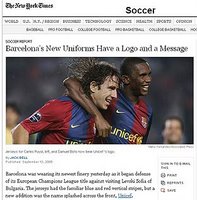
Do you know that feeling of excitement when you meet someone who share your mission? That's how I felt when I was first directed into
Fatih's blog.
Famous Blogger Indonesia A. Fatih Syuhud is a big driver of the "bottom-up information" movement. He says,
I'd love to see many more Indonesian bloggers blog in English, the most-widely-understood world language. So that the world knows and understands more about Indonesia by reading anything written by Blogger Indonesia.
Back in 2001, when I was so excited about the "bridging the
digital divide" movement, my friend, Kang Didi, adjusted my perspective by saying this:
The most frightening aspect of the digital divide is not that the poor won’t get information, but that the poor won’t be able to contribute the making of mainstream knowledges, that they will be stuck as knowledge consumers, never producers, and that one day their local knowledges and wisdoms will disappear.
Back in those days, blogs were not so far developed. For the average people to get their message across in the Internet, they'd have to learn
HTML. Then they'd have to learn tricks on how to get their website found in search engines. Today, blogs make the "bottom-up information" movement more easier and accessible. One does not have to learn HTML. Machines built into blog providers, also tools such as
technorati and
del.icio.us, make blogs easy to find. Audience has also widened by people being more critical of mainstream media. A good example of the "bottom-up information" movement is
Global Voices, for which Fatih and my friend,
Enda, are contributors.
Still, I think the "bottom-up information" movement cannot stand alone. It needs to be complimented by "better top-down information." Currently there are a lot of knowledges and research results (at the elite level, i.e.,
LIPI,
BPPT) that are useful for poor. However, they are presented in such a way that is "un-readable" by the poor. For example, a farmer in Salatiga told me:
Yes, they trained me to use the Internet. I wanted to find information about better technologies for farming chilly. I found it. But it's a 20-page report! After reading the first 2 pages, I gave up. I didn't understand the language. It's too technical.
The Government has tried to deal with this by making the
Warintek CD-ROMs: a compilation of Indonesian local, practical knowledges. The
Pe-PP project is using the role of "infomobilizers" (community organizers with an ICT perspective), so that by way of information found over the Internet and direct facilitation (meaning contextualization and translation into "the people's language"), a farmer group in Muneng, Madiun, was enabled to grow better, bigger melons and find the buyers. That's why, as much as I agree with Fatih about people blogging in English, I'd also suggest people to
blog in plain, simple Bahasa Indonesia. Or any traditional language.
Then there's also a matter of "side-way information," from one member of a community/ class/ group to another member. This is community building, and there's already many examples of this on the Internet. However, we need to see more "side-way information" building between the poor and marginalized. An attempt at this is the
Saluran Informasi Akar Rumput initiative.
Each of these three movements need champions. And A. Fatih Syuhud, hands down, is one of the best champions of the "bottom-up information" movement.
This week, Fatih made me "
Blogger of the Week." It sure is an honor, and I humbly thank him.
 technorati tags: information, knowledge, ICT-for-development
technorati tags: information, knowledge, ICT-for-development
 technorati tags: political-economy
technorati tags: political-economy




 Jakarta is building corridors IV-VII of dedicated bus lanes ("
Jakarta is building corridors IV-VII of dedicated bus lanes ("